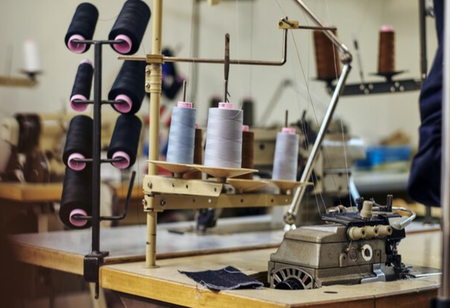
For a decade, Bangladeshi textile worker Naim Pramanik embroidered shirts and trousers for top Western brands, which were worn by the wealthy all over the world. The 28-year-old is now unemployed, having been fired for daring to participate in protests for a living wage.
"Some of the clothes we make sell for $100 a piece in shops in America and Europe," he remarked, holding up brands from American fashion behemoth Tommy Hilfiger and British designer George. "We don't get more than $100 a month."
With over 170 million residents, the South Asian country was shaken by its biggest labor unrest in a decade last month. Tens of thousands of workers clashed with police over a 23,000-taka ($208) minimum monthly salary, an increase from the government's 8,300 taka set five years ago. A total of five persons were killed.
Last month, Pramanik joined protests because his $75 monthly wage was "killing us." The garment sector has been a main engine of Bangladesh's spectacular economic growth, surpassing neighboring India in GDP per capita and making it a favorite of Western companies such as H&M, Levi's, Uniqlo, and Zara.
However, experts claim that the business has failed to elevate its four million employees out of poverty. "We took to the streets for our legitimate demands, and that's why my factory fired me," explained Pramanik, who rose to prominence when comments he made to a news website during protests were extensively circulated on social media.
According to a spokeswoman for his former job, Wear Mag, he was fired because "he was absent from duties for days." Pramanik pulled out an almost empty pot of rice while sitting on the bed in his cell-like, 4.5-square-metre (48-square-foot) home in the Pallabi area of Dhaka, which he shares with his wife and infant.
"These are the last of my rice grains." "I won't be able to eat anything after this," he said. "I'll have to either beg or borrow to provide food."
He received a severance compensation worth 67,000 taka ($610), but bills ate up much of it, and he is unsure how he can pay his next rent demand. Pramanik transferred a large portion of his earnings to his family in a village in the northern rural region of Sirajganj, where many have departed since farming jobs dried up due to agricultural mechanisation.
He shares a kitchen and a toilet with eight other families in Dhaka. "After paying my house rent and debts, nothing remains," he explained, concerned about providing for his child. "Look at my house; it's devoid of anything." "I sleep on a shattered bed."
The Bare Minimum
A state-appointed council boosted the minimum monthly pay by 56% to 12,500 taka last month, but unions rejected the wage, claiming it did not keep pace with rising food, rent, and healthcare costs. According to the global rights organisation Clean Clothes Campaign, it is "not a living wage, but the bare minimum required for workers to make ends meet." Protests have since ceased in the aftermath of a violent police crackdown, but unions have warned that they may resurface if demands are not granted by early January, when Bangladesh will also hold general elections. Owners of garment factories are among the wealthiest persons in the country, and numerous are also legislators.
Pramanik isn't the only one who's been fired. According to unions, hundreds of workers have lost their jobs as a result of their participation in the protests. Prodip Ray, 38, a union official who coordinated rallies in the capital's Mirpur area, claimed that there is a "culture" of dismissing workers "just because they participated in a protest." Akter, a 28-year-old single mother, asked not to be fully identified for fear of punishment.
"I don't know how I'm going to get through this month," she admitted, adding that she had less than four dollars in savings. "I don't know how I'll take care of my son... the time to pay the house rent is knocking."

